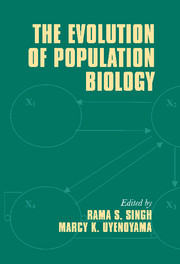Book contents
- Frontmatter
- Contents
- List of contributors
- Publications of R. C. Lewontin
- Preface
- Introduction
- Part I Historical foundations and perspectives
- Part II Genotypes to phenotypes: new genetic and bioinformatic advances
- 3 Genetic dissection of quantitative traits
- 4 Gene expression profiling in evolutionary genetics
- 5 Population biology and bioinformatics
- 6 Beyond beanbag genetics: Wright's adaptive landscape, gene interaction networks, and the evolution of new genetic systems
- Part III Phenotypes to fitness: genetics and ecology of populations
- Part IV Genes, organisms, and environment: evolutionary case studies
- Part V Applied population biology: biodiversity and food, disease, and health
- Index
4 - Gene expression profiling in evolutionary genetics
Published online by Cambridge University Press: 08 January 2010
- Frontmatter
- Contents
- List of contributors
- Publications of R. C. Lewontin
- Preface
- Introduction
- Part I Historical foundations and perspectives
- Part II Genotypes to phenotypes: new genetic and bioinformatic advances
- 3 Genetic dissection of quantitative traits
- 4 Gene expression profiling in evolutionary genetics
- 5 Population biology and bioinformatics
- 6 Beyond beanbag genetics: Wright's adaptive landscape, gene interaction networks, and the evolution of new genetic systems
- Part III Phenotypes to fitness: genetics and ecology of populations
- Part IV Genes, organisms, and environment: evolutionary case studies
- Part V Applied population biology: biodiversity and food, disease, and health
- Index
Summary
Introduction
Lewontin (1974) has characterized much of the history of population genetics as “the struggle to measure variation,” especially genetic variation at the molecular level. His characterization portrays a time when population geneticists were severely limited in the techniques that could be applied to organisms in natural populations. Fortunately, during the past 25 years molecular biology has supported a steady stream of innovative approaches and techniques that are widely applicable to natural populations. Chief among these have been chain-termination methods of DNA sequencing (Sanger et al. 1977) and the polymerase chain reaction (Saiki et al. 1985). From these have emerged highthroughput DNA sequencing strategies resulting in the complete sequences of the genomes of innumerable organelles, viruses, prokaryotes, and agents of infectious disease, as well as the genomes of most of the key model organisms used in molecular genetics and, of course, the human genome. The availability of genomic sequences has already resulted in the new field of comparative genomics (Koonin et al. 2000).
By contrast, in population genetics the struggle to measure variation was largely a struggle to detect differences between genotypes of organisms within a single species. Variation within populations is important because it is essential to Darwinism to understand how genetic differences within species become transformed into differences between species over evolutionary time.
- Type
- Chapter
- Information
- The Evolution of Population Biology , pp. 74 - 93Publisher: Cambridge University PressPrint publication year: 2004



